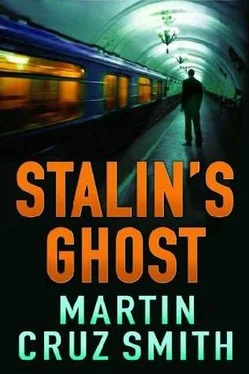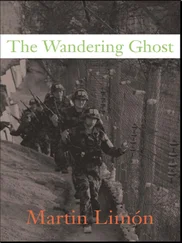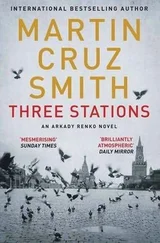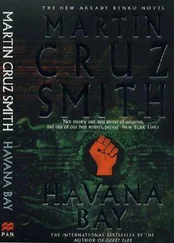Martin Smith - Stalin’s Ghost
Здесь есть возможность читать онлайн «Martin Smith - Stalin’s Ghost» весь текст электронной книги совершенно бесплатно (целиком полную версию без сокращений). В некоторых случаях можно слушать аудио, скачать через торрент в формате fb2 и присутствует краткое содержание. Жанр: Триллер, на английском языке. Описание произведения, (предисловие) а так же отзывы посетителей доступны на портале библиотеки ЛибКат.
- Название:Stalin’s Ghost
- Автор:
- Жанр:
- Год:неизвестен
- ISBN:нет данных
- Рейтинг книги:4 / 5. Голосов: 1
-
Избранное:Добавить в избранное
- Отзывы:
-
Ваша оценка:
- 80
- 1
- 2
- 3
- 4
- 5
Stalin’s Ghost: краткое содержание, описание и аннотация
Предлагаем к чтению аннотацию, описание, краткое содержание или предисловие (зависит от того, что написал сам автор книги «Stalin’s Ghost»). Если вы не нашли необходимую информацию о книге — напишите в комментариях, мы постараемся отыскать её.
Stalin’s Ghost — читать онлайн бесплатно полную книгу (весь текст) целиком
Ниже представлен текст книги, разбитый по страницам. Система сохранения места последней прочитанной страницы, позволяет с удобством читать онлайн бесплатно книгу «Stalin’s Ghost», без необходимости каждый раз заново искать на чём Вы остановились. Поставьте закладку, и сможете в любой момент перейти на страницу, на которой закончили чтение.
Интервал:
Закладка:
Part of Arkady was back in the Kuznetsovs’ bloody apartment, where he and Isakov seemed to have exercised a gentlemen’s agreement not to mention Eva. No, neither of them took things personally.
Arkady searched between shuttered kiosks and flushed out a pair of drunks so unsteady they couldn’t stand except against a wall.
“Stay together!” he told people. Present a solid front, even yaks knew that much, he thought.
But it was each for his own. People closest to the Metro doors clung to their position; those behind pressed harder to the fore, while the crowd further back began to scatter. It was like watching wolves cull a herd as boys flowed out of the dark in packs of five or six, wearing black garbage bags and balaclavas that made them virtually invisible. Old people they plucked where they stood. Bigger game they swarmed; a monk was pulled down on the ice by his cassock and stripped of his gilded cross. One moment he had two boys in his grasp, and then nothing but trash bags.
Arkady was circled by boys. The leader wasn’t more than fifteen, not afraid to show his moon face and wispy mustache. He pulled up his bag to produce a slim revolver he aimed at Arkady. Arkady was not amazed that a kid could get a firearm. Railroad police, the lowest level of law enforcement, were still issued hundred-year-old revolvers. Had Georgy come upon a drunken guard sleeping in a boxcar and stripped him of his gun? At Three Stations stranger things had happened.
“Bang,” the boy said.
Melting snow coursed down Arkady’s back.
“Hello, Georgy,” Arkady said.
“How would you like a hole in the head?” Georgy asked.
“Not especially. Where did you find that?”
“It’s mine.”
“It’s a real antique. It outlasted the Soviet Union.”
“It still works.”
“Where’s Zhenya?”
“I could blow your brains out.”
“He could,” said the smallest boy in the circle. “He practices on rats.”
“Isn’t that what you are?” Georgy asked Arkady. “Aren’t you a rat?”
After two days without sleep anything was possible. The pistol was a Nagant, a double-action, and the hammer was cocked. On the other hand, the trigger demanded a serious squeeze; Georgy wouldn’t fire accidentally. Arkady couldn’t see how many rounds were in the cylinder, but you can’t have everything.
He rolled back the cap of the smaller boy. “Fedya, you’re up early today.”
Georgy prodded Arkady with the gun. “Never mind him.”
“Fedya, I just want to talk to Zhenya.”
“You’re not listening,” Georgy said.
“He plays chess,” Arkady told Fedya. “You should ask him to teach you how to play chess.”
“Shut up!” Georgy said.
Fedya stole a glance at the dark of a doorway, where a foot stepped back beyond the reach of the light. He felt Zhenya’s gaze and saw the scene from Zhenya’s point of view: the snow-covered battlefield, casualties nursing their dignity and winners dragging off packages like Christmas presents.
A chorus of police whistles promised that authority was on its way. The militia had clubs but, in the dark, who could tell whom to beat? They did their best. Meanwhile, the boys disappeared, not so much retreating as dissolving into shadows. Georgy backed off, the gun still pointed at Arkady, who watched the boys gather and slip away.
“Zhenya!”
Georgy’s group slipped between trash bins, climbed a chain-link fence, and in a moment were gone in the direction of the railroad yard, a confusing array of sidetracks and trains on any night and now a white maze. Arkady followed their prints through the snow until all the footsteps went in separate directions and left him spinning.
Arkady retreated to the station. He staggered into the still atmosphere of the station’s great hall, the suspended breath of the chandeliers, the rows of motionless bodies. As if sleep were the first business of the station, train departures were not announced. Take me to romantic Kazan, Arkady thought, to the land of peacocks and the Golden Horde. He was coughing so hard he dropped his cigarettes. Disgusted, he crumpled the pack and tossed it aside.
As he came out the front of the station he saw-briefly, before snow obscured his view-Georgy and Fedya with a boy that could have been Zhenya crossing the traffic island in the middle of the square. Arkady stumbled down the steps and squeezed between parked cars onto the street. Even blinkered by snow the lights of the square were bright. No trolleys out yet, although overhead cables hummed. By the time Arkady reached the island the three boys were halfway to the opposite sidewalk, but he had caught his breath and was gaining with every step when the blast of a horn brought him up short.
The three turned at the sound.
“Zhenya!”
Arkady retreated out of the way of a snowplow. The machine traveled in a haze of headlights and crystals, snow spewing from the blade. Arkady couldn’t run in front because a second plow followed at an angle, and a third, lumbering and grinding, walling off the sidewalk with snow.
4
Arkady and Eva lay in a gray light that spread through rooms mostly bare of furniture. Arkady had inherited the apartment from his father; it was huge in comparison to his old flat, which they had left because there she felt the presence of Irina. “I won’t compete with a ghost,” she said. A table here, a portable television there were more like claims of residence than actuality. Arkady had disposed of all his father’s possessions, any toehold the dead man might retain, except for his books and pictures, which were boxed and sealed in the office closet.
From the outside the building was an architectural collision of Gothic buttresses and Moorish arches, but, inside, the digs were fairly grand, with high prewar ceilings and parquet floors. The apartment house had been built for Party and military elite, who were proud of their address, although during Stalin’s time it was also where the most people were taken away in the middle of the night, not to be seen again for years, if ever. Residents had listened with dread for a knock on the door or even the ascent of an elevator. Rumor claimed that special passages had been built into the walls to accommodate the agents of the state. What Arkady found interesting was that, even knowing the building was a chopping block, no one had dared decline the honor of moving in.
The truck with all their earthly possessions was a week late and they had been living in a makeshift way, their base a mattress they laid directly on the parquet floor. A quilted coverlet spilled off the bed, but Arkady and Eva were warm because the building was a prodigy of heat. They had slept the day away next to a tray crammed with bread, strawberry jam and tea. The wind had died and snow fell in thick, feathery clumps that drifted as shadows down the curtains.
Her body could have been a girl’s, her breasts small and her skin so pale and unlined that he half expected it to carry an imprint of him. With her black hair, she was the perfect creature of dusk. At night when she couldn’t sleep, which was often, she walked around the apartment in a robe and bare feet. Some rooms, like the office, they didn’t use at all, except for storing boxes of photographs of his father and Irina he had brought by car. At night the parquet floor would groan; she preferred sleeping in the daytime, when fewer ghosts were about.
Eva didn’t need his ghosts, she had her own. She had been a schoolgirl in Kiev, marching in the May Day parade four days after the meltdown at the Chernobyl nuclear reactor station because the authorities assured the public that the situation was under control. A hundred thousand children marched into an invisible rain of radioactive plutonium, potassium, strontium, cesium-137. No one in the parade curled up and died on the spot, but she was labeled a survivor, it being generally understood that survivors, especially women, were both barren and contagious.
Читать дальшеИнтервал:
Закладка:
Похожие книги на «Stalin’s Ghost»
Представляем Вашему вниманию похожие книги на «Stalin’s Ghost» списком для выбора. Мы отобрали схожую по названию и смыслу литературу в надежде предоставить читателям больше вариантов отыскать новые, интересные, ещё непрочитанные произведения.
Обсуждение, отзывы о книге «Stalin’s Ghost» и просто собственные мнения читателей. Оставьте ваши комментарии, напишите, что Вы думаете о произведении, его смысле или главных героях. Укажите что конкретно понравилось, а что нет, и почему Вы так считаете.











